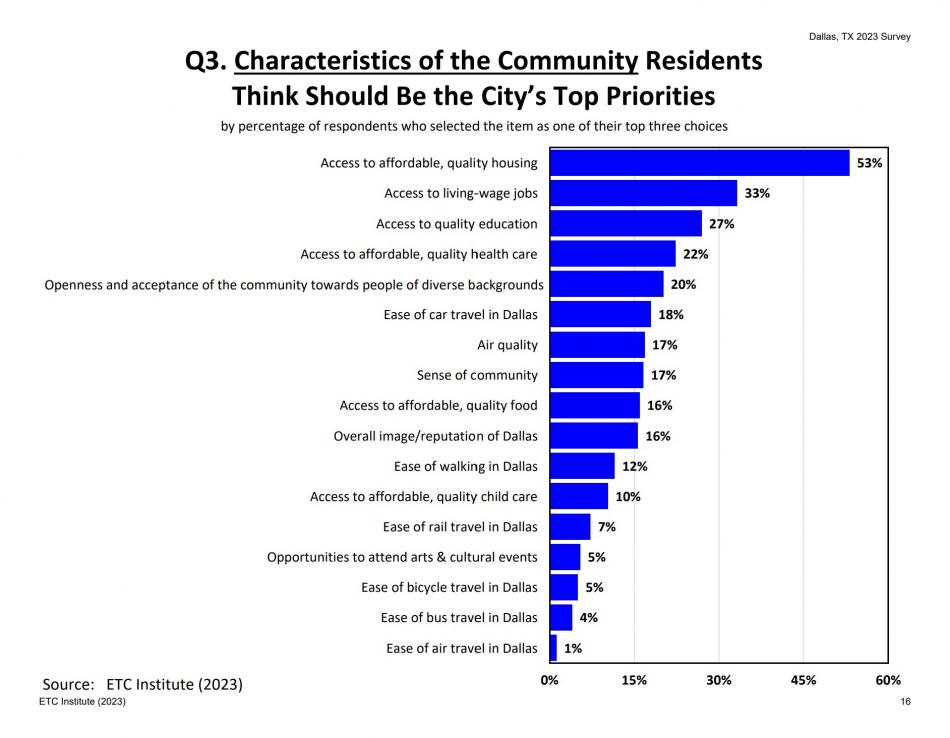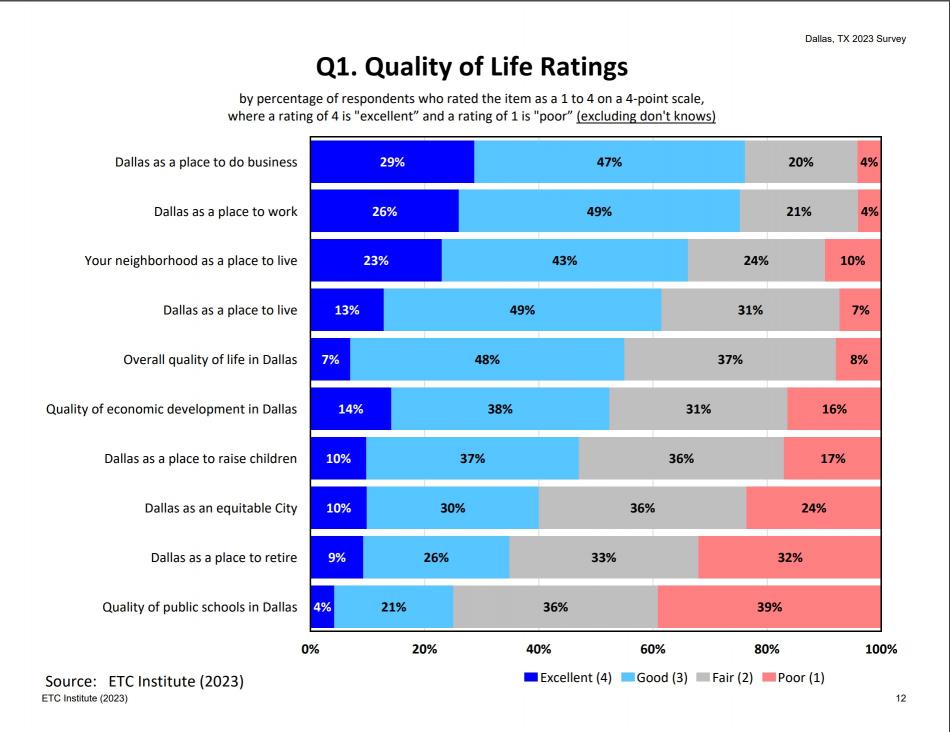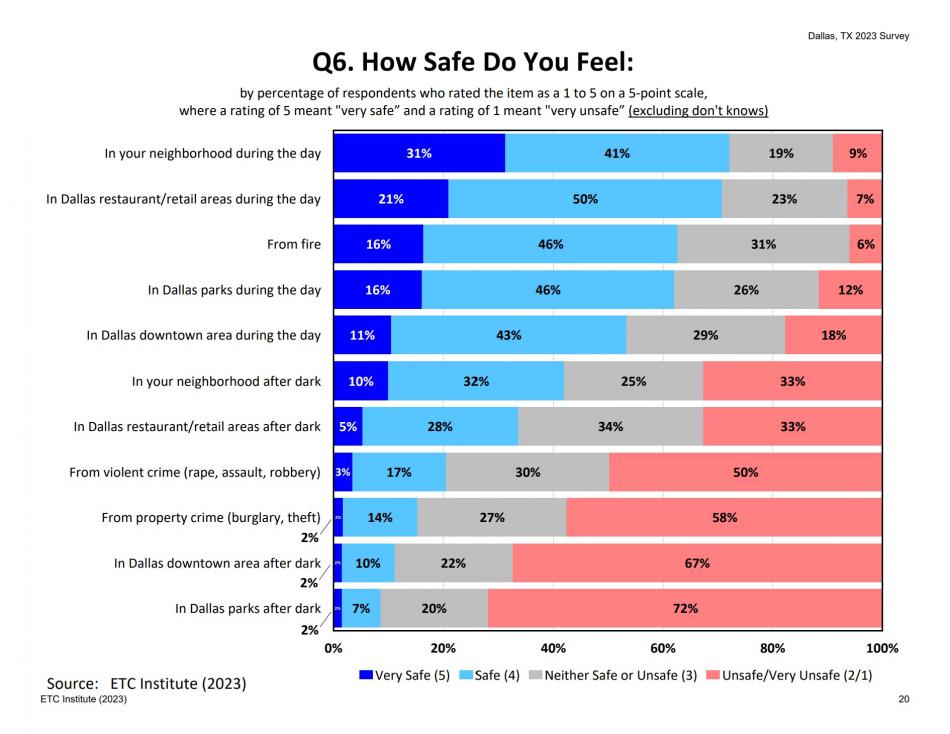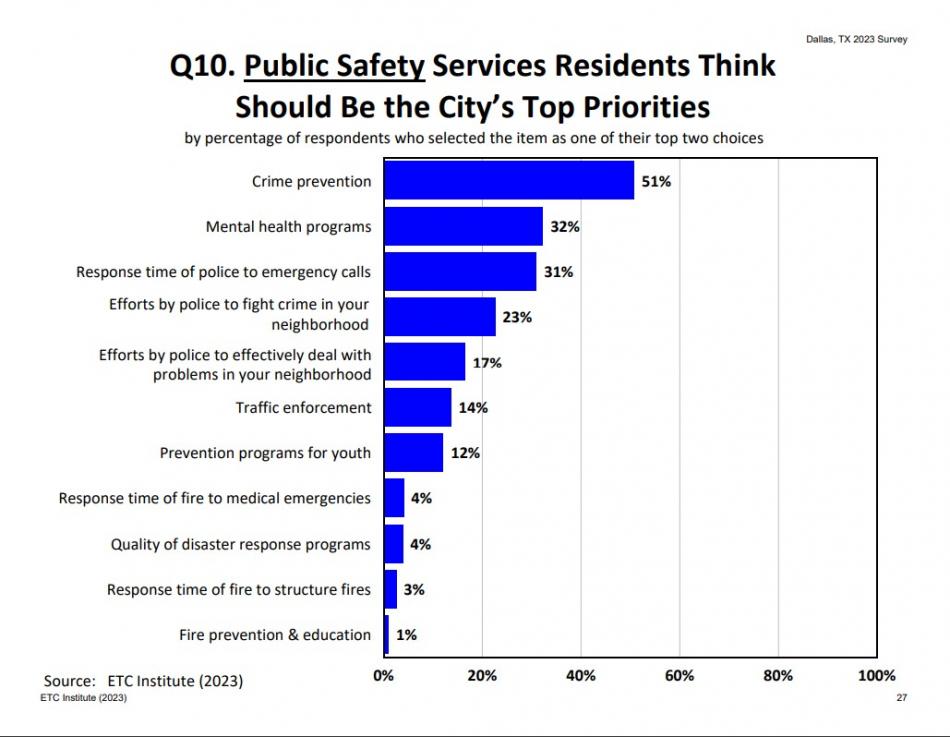On June 21, 2023, the City of Dallas released their community survey, which has been conducted regularly (not quite annually) since 2005. The 2023 survey covered 1475 respondents with at least 100 responses from each of The City's 14 Council Districts, enough to estimate sentiment within a 95% confidence interval. Results were overwhelming positive for the business environment and similarly negative for public safety.
While the results were not necessarily surprising, investors can find insight into supply and demand through locals' responses. The 180 page report covers many aspects of the city, with highlights expanded upon below.
Quality of life results vary to an extreme extent. The vast majority of respondents consider Dallas to be a good place to do business and work, a sentiment that aligns with the rapid investment and growth within the city. The Metroplex's pro-business local government and top research universities, combined with Texas' quasi-laissez-faire (say that 10 times fast) regulation and lack of income tax create an environment prime for innovation and wealth.
Contrary to that, however, only about half of respondents consider Dallas to have good or excellent economic development. It would not be a stretch to suppose this ties into the poor sentiment regarding equity and public schools. There are clear lines of gentrification within Dallas and, with continued population growth, many residents feel they are being pushed out of their neighborhoods.
The safety results should be an embarrassment to The City. Residents should feel safe at night, especially in their own neighborhoods. The fact that more than 2/3 of residents feel unsafe in parks or downtown at night is more reminiscent of 1970s New York City than a thriving metropolis, yet it is unsurprising. Downtown often feels lawless at night -- even from the relative safety of a personal vehicle.
The majority of residents feeling unsafe from both violent and property crime should serve as a major wakeup call for City officials. A world-class convention center won't attract visitors if they do not feel safe -- not that residents should have to move near a business center to feel safe, either. As shown below, policing seems to be the major issue at hand.
The problem does not seem to be getting any better, according to DPD's own report from May 1, 2023. Dallas Police Department response times have gotten dramatically worse this year:
- Priority 1 "Emergency" response times (8 minute goal) have increased 20% (10.09 minutes vs 8.37 minutes), now 2 minutes behind the goal when seconds count
- Priority 2 "Prompt" response times (12 minute goal) have increased 205% (92.05 minutes vs 44.75 minutes), now nearly 8 times the goal
- Priority 3 "Service" response times (30 minute goal) have increased 271% (584.06 minutes vs 215.00 minutes), now over 9 times the goal
- Priority 4 "Non-Critical" response times (60 minute goal) have increased 215% (598.53 minutes vs 278.13 minutes), now almost 6 times the goal
-
For some perspective, the notoriously long Lord of The Rings trilogy has a full runtime, including credits, of 604 minutes.
Dispatch times seem to be the heart of the issue, with non-emergency calls averaging between 5 and 16 times longer than the goal. This increases the issues of inequity within Dallas -- Highland Park and University Park (not included in the survey) residents almost certainly do not face these issues.
 Everything else makes sense, but how did 1% of respondents say ease of air travel should be a top 3 priority?Source: City of Dallas
Everything else makes sense, but how did 1% of respondents say ease of air travel should be a top 3 priority?Source: City of Dallas
Priority community issues tie into the other issues discussed. Affordable housing is far and away the biggest concern, which should come as no surprise. Education, quality job access, and healthcare are undoubtedly intertwined with the issues of public schools and equity.
Investors should be aware of these issues plaguing Dallas and push to resolve them. The affordable housing crisis can offer developers opportunity to obtain public financing, an even more valuable asset with the tightening credit market. Crime issues may also prove to be a lucrative opportunity (this time not for the criminals). Improved public safety will likely boost NOI and, in turn, asset values: less money spent on insurance and repairs means more money left for distribution, lower discount rates, and a higher income to be capitalized.
For those interested, uncensored responses to the open-ended question of "Other Problems", many of which are not fit to publish, begin on page 160. Open-ended responses from residents bypass any potentially misleading data presentation. These responses can also help investors understand issues that lie beyond the hard data.
As a bonus, there are some entertaining gems to be found. Here are some verbatim highlights deemed acceptable to publish:
- PD is working hard
- Gerry Meandering
- Worst roads ever.
- Too many garage sales
- Churches
- Too much money spend on WOKE agenda.
- Street racing - dodge chargers









